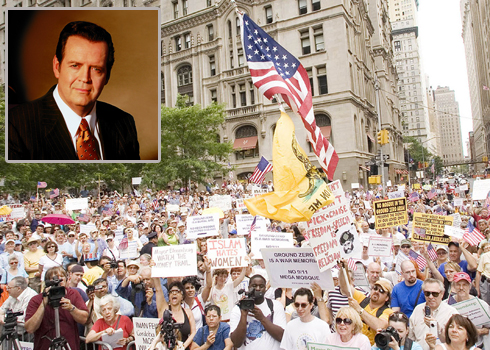As president of the Southern Baptist Convention’s Ethics and Religious Liberty Commission, Dr. Richard Land is an influential opponent of the Cordoba House project in New York. But when he’s not speaking on behalf of one of the most powerful religious bodies in the country, Land has a second — some would say ironic — ecumenical role: member of the federally created United States Commission on International Religious Freedom.
In his role as a commissioner, Land’s job is to press for a U.S. foreign policy that advances religious freedoms around the world. Reached by phone today, Land maintained that there is no contradiction between his service on the Commission and his efforts to see the Cordoba House Islamic cultural center project moved farther north in Manhattan.
“Our role is to make recommendations both to the executive branch and to the legislative branch on ways in which our government policies can be used to promote religious freedom overseas,” Land said. “I see absolutely no tension whatsoever. We are forbidden by statute from addressing any domestic religious freedom issue.”
Furthermore, Land says, religious people in many foreign countries — the countries the commission is most concerned with — suffer far greater opposition than do the sponsors and supporters of the Cordoba House project. “They would envy and relish the opportunity to have the peaceful debate over the mosque in the near vicinity of Ground Zero,” he says.
Land insists that his opposition to the Cordoba House project is principled — that he would and has opposed similar efforts when they upset local populations.
“There is a Japanese Shinto shine, I am told, blocks from the USS Arizona,” Land said. “That isn’t appropriate even 60 years later. Three-thousand Americans died there and they died at the hands of people acitng on behalf of the Japanese Empire.”
There isn’t, in fact, a Shinto shrine near Pearl Harbor, though many conservatives use this hypothetical as an example of a non-Muslim shrine they’d oppose for similar reasons. Rush Limbaugh used the same example, though he mistakenly referred to it as a “Hindu temple.”
Likewise, Land said, “I agreed with the Pope’s decision to overrule the Carmelite nuns when they wanted to build a convent immediately adjacent to Auschwitz.”
Carmelite nuns did once open a convent just outside Auschwitz, in a building formerly used by the Nazis, over Jewish protests. Eventually religious groups reached an agreement whereby the nuns would move, but that didn’t happen for several years — and not until Pope John Paul II weighed in, in advance of a visit to the concentration camp. Other conservatives have likewise cited this episode as a precedent for their opposition to the Cordoba House project.
“It was good manners. It was good taste,” Land said.
Land said he’s not worried in the slightest that his position on Cordoba House might come back to haunt him in the future if a church he supports runs into local opposition, and argued that the principles supporting his opposition to the project cut both ways.
“I think that interfaith cooperation is greatly enhanced by doing unto others as you would have them do unto you and that involves being sensitive to other people’s feelings, and engaging in what my mother would call ‘good manners,'” Land insisted. “For nine years now we’ve had a lot of calls for American people who are not Muslms to be sensitive to concerns of American Muslims and not in any way make them feel like they’re not wanted. I think that America has done a pretty good job of responding to that [and] I think now is the time for Muslim Americans to be sensitive to the concerns of their fellow Americans.”
What’s a good remedy? Echoing one of the earliest and fiercest opponents of the Cordoba House project, Pamela Geller, Land said the Mosque Exclusion Zone need only extend a few hundred feet. “My position on the Mosque is that they should move it two or three blocks further north.”
For the time being, developers are adamant that they’ll build the cultural center at their preferred location — which they currently own — two blocks north of where the World Trade Center used to stand. If they don’t budge, Land says, opponents will have two levers to pull.
“One of the wonderful things about America is if we don’t like what our elected officials do, we can show our opposition [during the next election],” Land said. “I can tell you that New Yorkers…New Yorkers tell me it’ll never get built in that location, because the construction workers will not cross the picket lines to do it, that the unions will not cross the picket lines to let it be built.”










